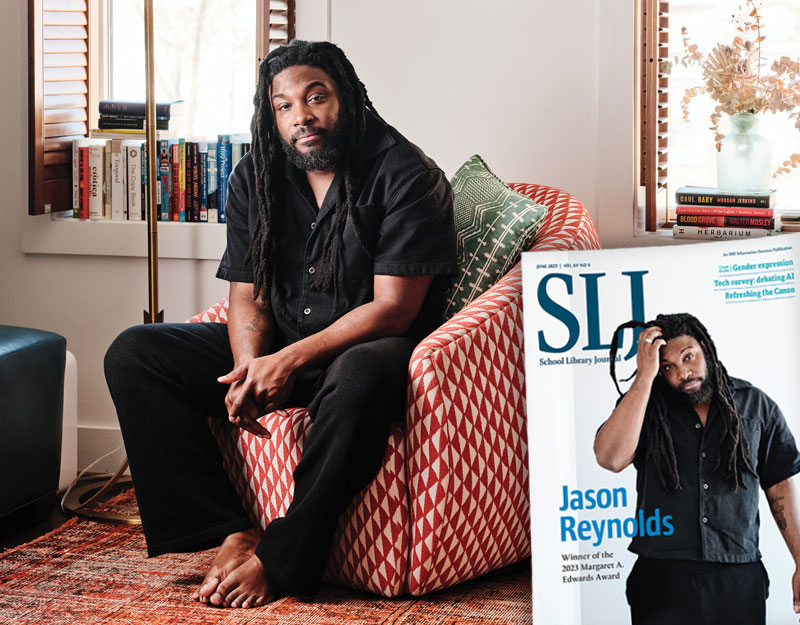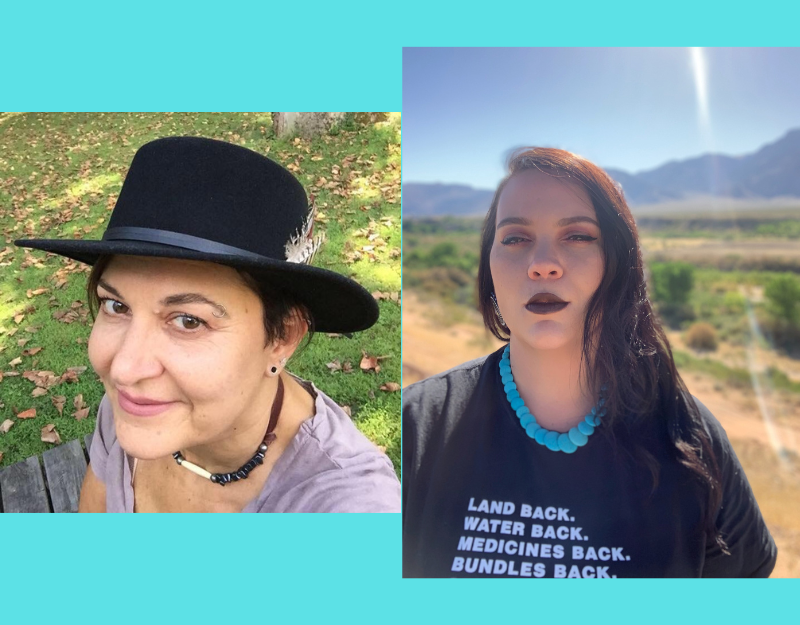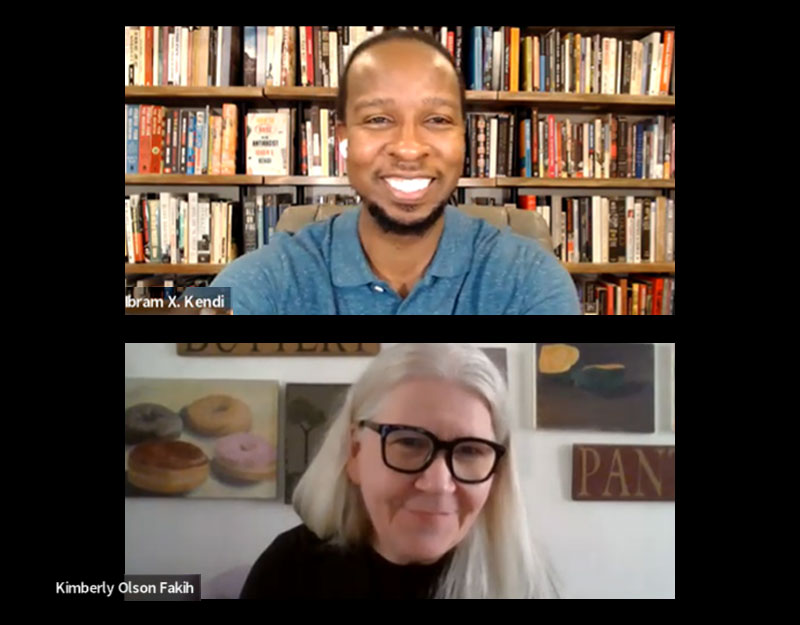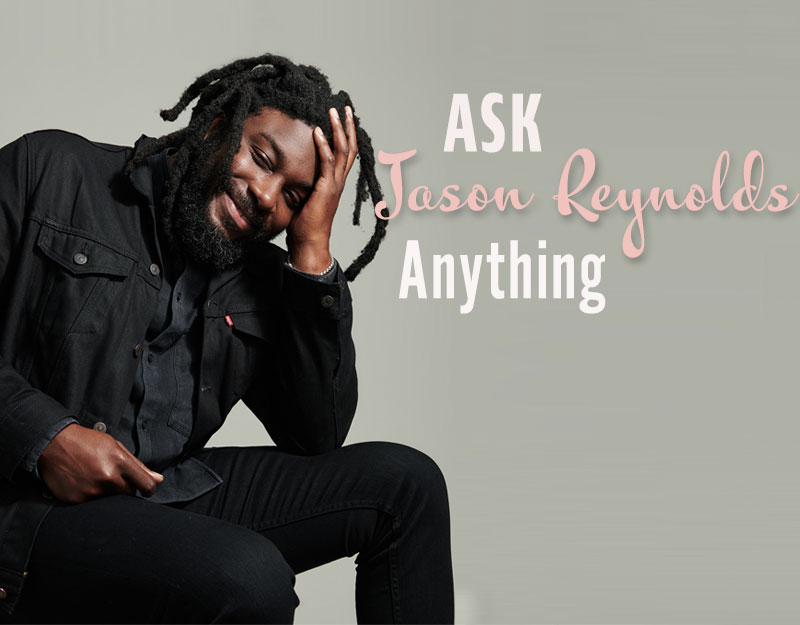The Busload of Books Takes Off: Matthew Swanson and Robbi Behr Tell All
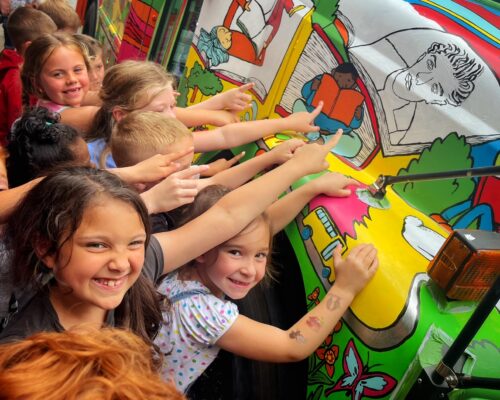
It seems to me that after having experienced a rather extreme form of forced homeschooling in 2020, few would opt to take the whole process to the next level. And by “next level” I mean helping public schools as much as humanly possible.
Meet author/illustrator duo Matthew Swanson and Robbi Behr. Just your average, everyday couple, who decided to pack their children and irrational dog into a bus full o’ books and engage in the The Busload of Books Tour. Described as a yearlong project built, “to promote literacy, celebrate America’s educators, and raise awareness of the challenges facing our nation’s public schools,” I was alerted to their efforts by Alison Morris at First Book, and found I wanted to know much much more. The best way? Straight from the horse’s mouth.
ADVERTISEMENT
ADVERTISEMENT
And I am not kidding when I say that this may be the best interview I’ve ever hosted on this site:
Betsy Bird: Thank you both for talking with me today! We have so much to discuss. Just to start us off, could you both tell me a little about yourself? What kinds of books for kids have you made? Would you consider yourself a husband-and-wife team?
Matthew Swanson: Let’s start with the easy part. We are Matthew Swanson and Robbi Behr, and yes, we consider ourselves to be a husband-and-wife team. We fall into the far extreme of that column, because we work together exclusively.
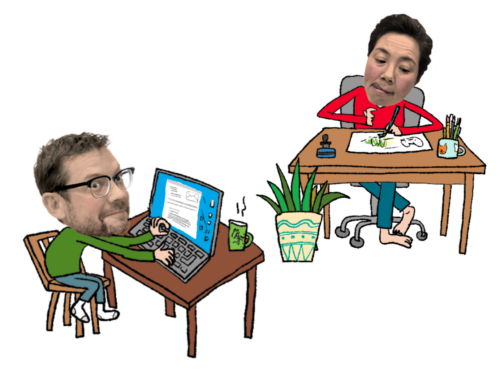
Robbi Behr: In part because we like it that way and in part because we have so many ideas in the pipeline that we will keep ourselves busy until we’re dead. Maybe someday Matthew will work with another illustrator because I’m so slow.
MS: I do work faster, but that just leaves me more time to wash dishes and make salads.
RB: That seems unfair. You could be making ten times as many books without your ball-and-chain of a wife.
MS: Maybe, but we are Robbi and Matthew and we make books together. It’s what we do. In terms of the types of books we make…
RB: We make picture books and illustrated middle grade novels.
MS: That’s what we make now. But we started twenty years ago [Robbi gasps] by making what we tended to describe as “odd, commercially nonviable picture books for adults.”
RB: We ran a small press called Idiots’ Books that published these strange little satirical books.
MS: Our favorites include The Baby is Disappointing, Understanding Traffic, and Avoid Disappointment and Future Regret.
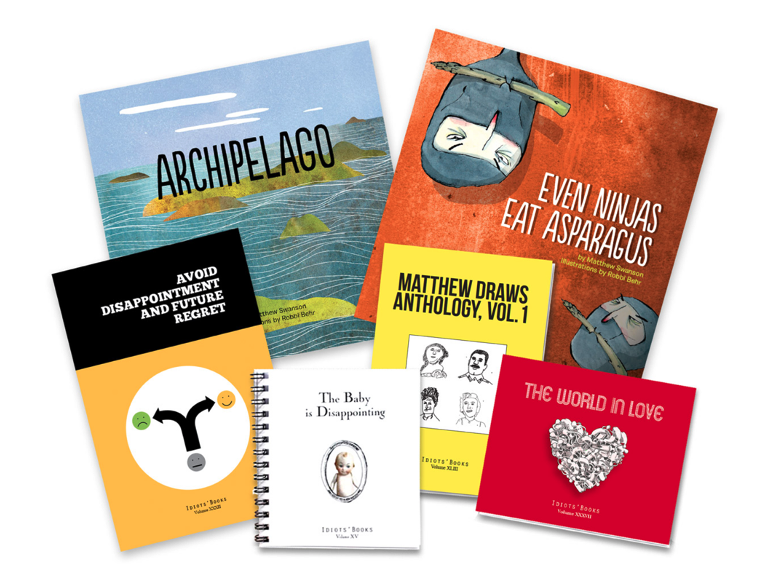
RB: Those books were not for children, though. Honestly, there weren’t many adults who liked them, either.
MS: The books were admittedly pretty strange. They were mostly for us. We got to spend those years making whatever we felt like making. It was total creative freedom.
RB: But then we started having kids and launched another small press called Bobbledy Books that made equally strange and an equally unpublishable picture books for them.
MS: Throughout our decade of self-publishing, we gradually made connections in the commercial publishing world. Eventually, an editor named Erin Stein said, “Look here, Matthew and Robbi, I see potential in you and your weird, dark, self-published book Babies Ruin Everything and I’d like to turn it into a trade picture book. But first you must remove the blood-sucking spiders and the Death of Santa.”
RB: I was sad to lose the spiders, but we went along with it because Erin asked so nicely.
MS: Since the kid-friendly version of Babies Ruin Everything was published by Macmillan in 2016, we’ve made a few more picture books and two middle grade series.
RB: Should we say what they are called?
MS: Because we suspect our publicist is watching, I will tell you that our other picture books are Everywhere, Wonder and Sunrise Summer. Our middle grade books are The Real McCoys trilogy and The Cookie Chronicles series.
RB: We also made a commercial version of our self-published book Ten Thousand Stories with Chronicle.
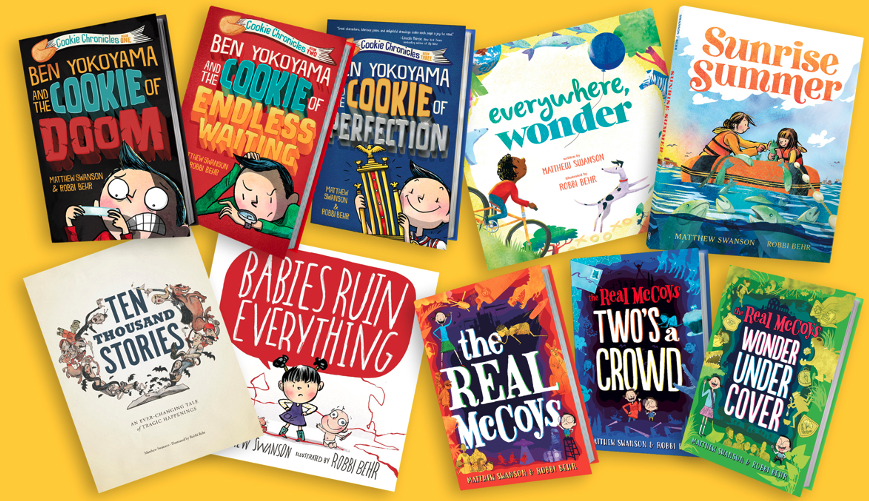
MS: The Real McCoys got lots of nice critical attention and the Cookie Chronicles are really taking off. Books one through three are out so far, book four comes out in September, book five comes out in March, and books six and seven are slated for 2024 and 2025. Book three was on the ALA summer reading list. I believe this is something librarians would want to know.
RB: We hope our publicist is satisfied now! Back to the hard-hitting questions!
BB: Well, hard-hitting-esque anyway. Your current Busload of Books tour is what particularly intrigues me today. Can you tell us what it is and what it encapsulates?
RB: Ooph. I can’t do it. “Encapsulates” makes it sound like there is one, overarching thing to say about it. But it’s more like an octopus swimming in spaghetti.
MS: This is exactly the sort of the hard-hitting question we were talking about! Let me give you the elevator speech. Robbi and I are going to spend the 2022-2023 academic year traveling the country in a garishly painted tiny home school bus, visiting one Title I-eligible school in every state, doing presentations on creativity and collaboration, and giving a hardcover book to every student and teacher in every school we visit. Which will be around 25,000 books total. We’ll be traveling with our four kids and our small, irrational dog.

RB: I like how you’re only describing the dog as irrational.
MS: Fair point. He’s especially irrational. But all of us are fairly…what about the children?
RB: It’s not fair to fault them for having irrational parents.
MS: Honestly, they are being real champions about this whole thing. Our bus is 24 feet long, so it’s not even a full-length bus. It has a tiny kitchen and a bank of lockers and a couch that turns into a bed.
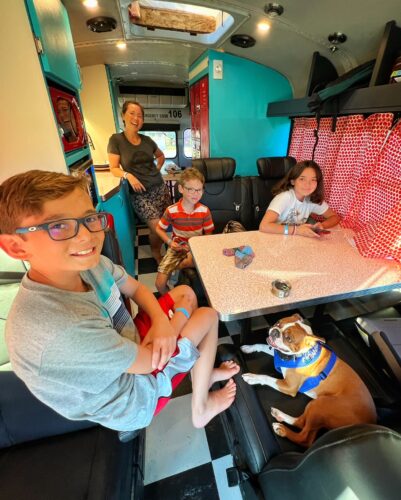
And, just to keep things interesting, it has no hot water and no bathroom.
RB: Because those things are a huge hassle! This country has plenty of bathrooms just begging for us to use them.
MS: Because square footage is limited, we’ve added a 6’x10’x4’ pop-up compartment on the roof, which is where we’re going to store the children when we park.
RB: The children are not suitcases! They will be sleeping comfortably in their panoramic storage container!
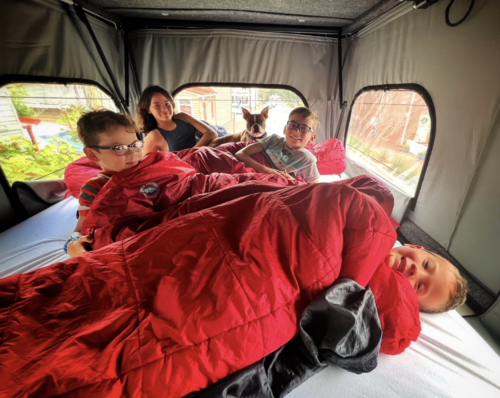
MS: The other thing we’ll be doing on the tour is bringing our followers along on our version of the great American road trip.
RB: We’ve crowd-sourced ideas to identify cool-but-lesser-known treasures of American culture, cuisine, kitsch, architecture, and history that we’ll share with our followers through daily photos, essays, and videos on our social channels and blog.
MS: Our publicist is probably sending everyone the appropriate links right now. We love you, Lili!
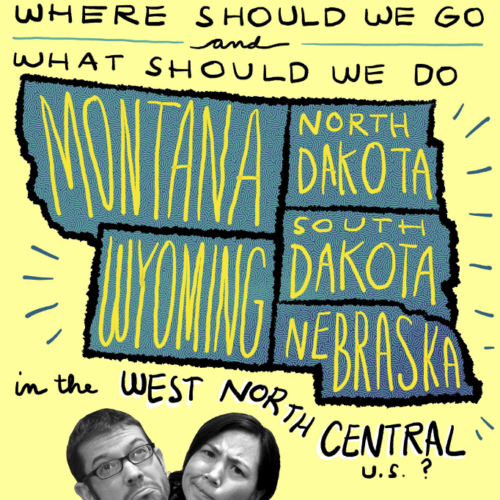
RB: Dumbles (the aforementioned irrational dog) will have his own Instagram account. He’s a grumpy old man and totally unphotogenic, but how many dogs get to visit all 50 states?
MS: It must be documented.
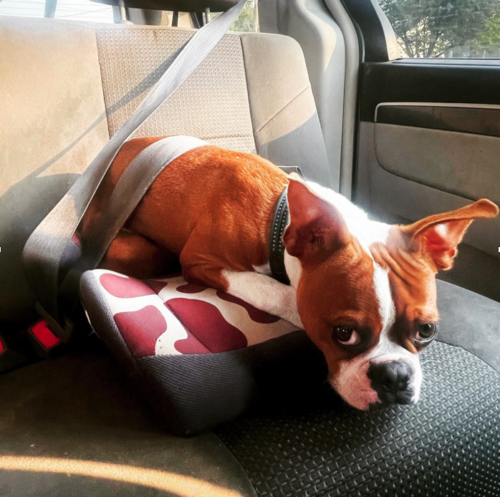
BB: I’m exhausted even thinking about the logistics involved here. How did you get the idea for the Busload of Books tour in the first place?
RB: Matthew and I both attended Title I schools, and our kids attend Title I schools, so we’ve seen firsthand the huge disparity between the resources and opportunities available in our school district and the resources and opportunities at the more affluent schools that invite us for author and illustrator visits.
MS: School visits do a lot of good—creating excitement and energizing kids to read and create, but so many schools just can’t afford them. So, we said to ourselves, “Let’s spend a day presenting at our kids’ school, and not just giving free assemblies, but also giving each student a free book.” There are a surprising number of kids at the school who don’t have a single book of their own.
RB: We put out the call to our friends and followers and figured it would take a long time to raise the money—if we were even able to pull it off.
MS: We needed about $4,000 to buy enough books for the whole school
RB: Which, to us, was an extraordinary amount of money. But we raised it in less than two days.
MS: People all over the country contributed. It wasn’t just our local community. People really liked this idea. Our visit was a huge success. Kids who’d never picked up a book started reading. Kids worked together to write stories and make comics. The impact was clear, so we started doing the same thing in other schools in our area and beyond.
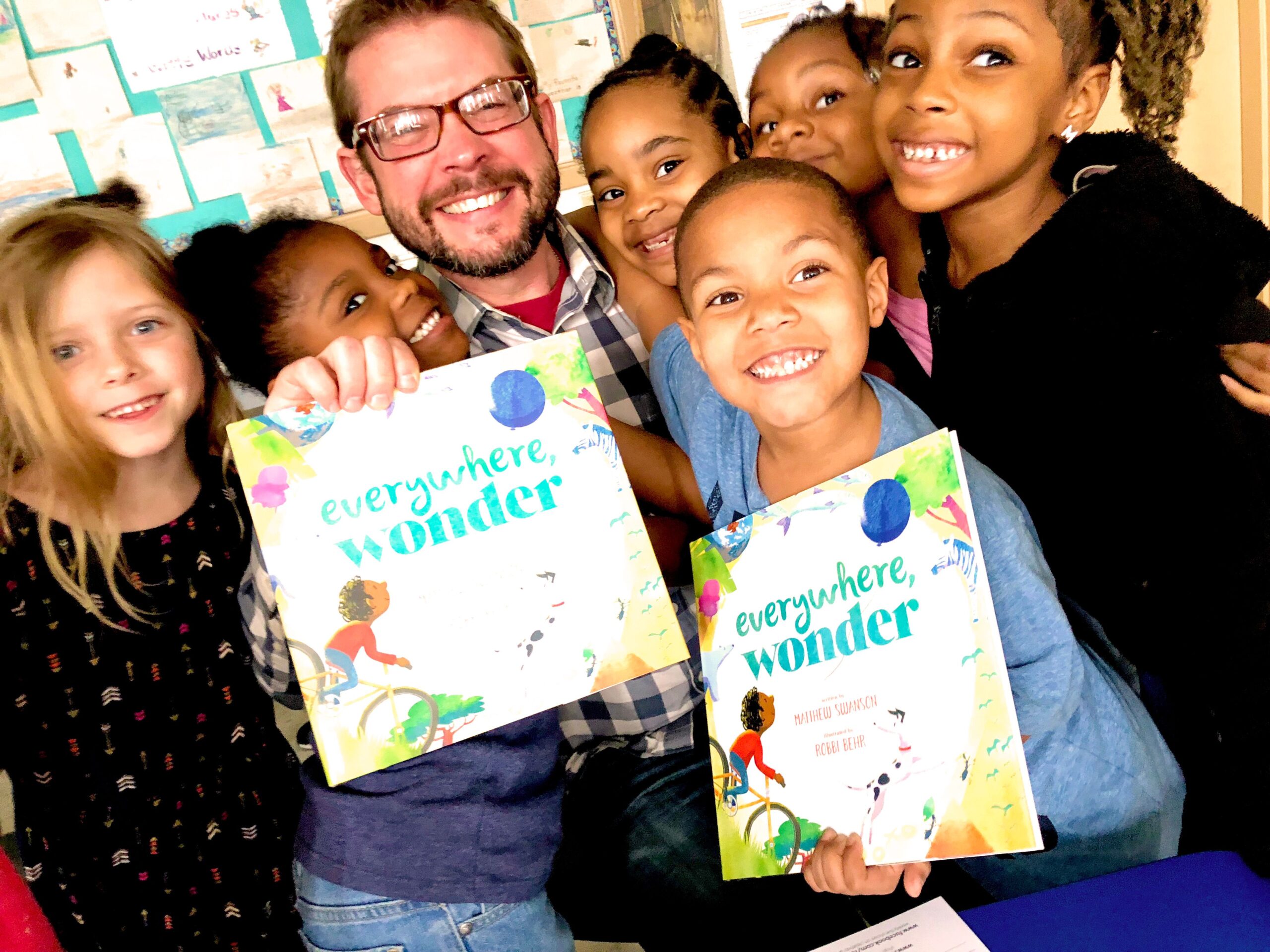

RB: We forged a partnership with the Title I coordinator in a nearby county and did visits and book giveaways in all the schools in her district, and every single time the results were amazing. We started thinking this was something we wanted to do at a larger scale—if we could find a way to fund it.
MS: Incidentally, and this is where things get a little weird, one day we got a call from a friend of ours who is a generous, visionary guy who makes great things happen in the world, and he said, “I believe in you two. I’m going to give you a grant because I know you’ll do something awesome with it.” And suddenly, we had $30,000 to work with.
RB: When Matthew said things got weird, he meant weird like $30,000 falling from the sky. Weird and lucky and humbling and great.
MS: We could have used the money to do bunch of local school visits, but one of the things we really want people to understand is that there are struggling public schools everywhere in this country—probably just down the road from wherever they live.
RB: We live in a lovely colonial town with brick sidewalks, and it seems like a well-resourced community. But our local elementary school has 88 percent poverty, and most people who live here have no idea.
MS: We figured the best way to highlight the national nature of this problem was to visit schools in every state. And to help folks understand the types of challenges these schools face.
RB: We want people to realize that educators at Title I schools are being asked to do so much more than the classic “reading, writing and arithmetic.” They are dealing with students who come to school hungry, without the clothes they need to stay warm, and with the additional layers of challenge that result from poverty and food insecurity.
MS: We want people to understand that these schools are struggling not because they are “bad schools,” but because the students’ require so much more than the staff numbers, classroom sizes, and budget can support.
RB: But these educators work so hard! The people who work at Title I schools rise every day above and beyond their job descriptions. A lot of them are exhausted and overwhelmed and demoralized, especially now in the context of the pandemic.
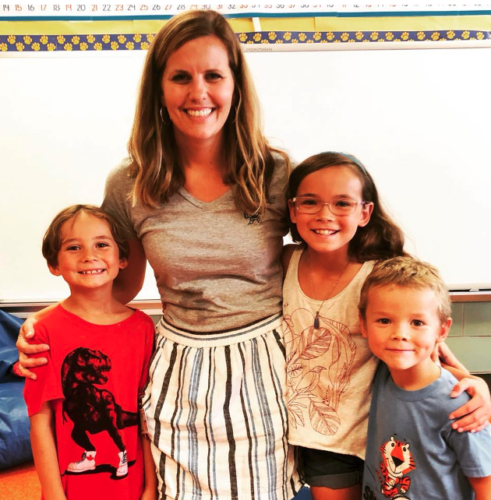
MS: So you’re seeing an exodus of great people from the profession because it’s just become untenably difficult.
RB: We hope to bring a spark of energy and excitement and positivity to these communities. Most of the teachers who applied for the Tour talked about how kids and teachers could really use a lift.
BB: Well, be sure to also tell us a little bit about your partnership with First Book. How did you connect with them? And how are they helping you while on this tour?
MS: We mentioned the Title I coordinator in the county next to ours, Amanda Ensor.
RB: Who is a FORCE.
MS: Her brother Max works at First Book, and when we told her about the Tour, she connected us because our missions are so aligned—and that conversation turned into a partnership that has made all the difference for our project.
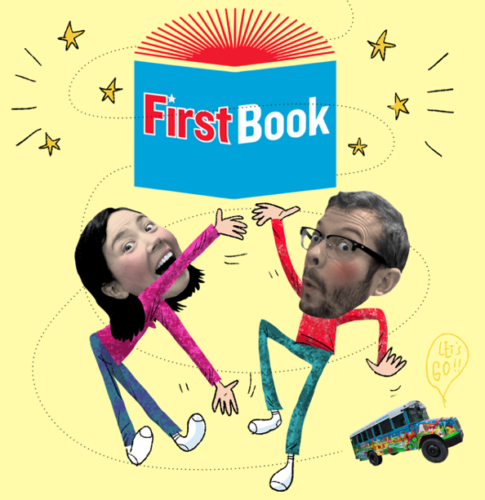
For anyone who doesn’t know, First Book provides low-cost books and educational supplies to Title I communities—more than 225,000 million books over the past thirty years. It’s free to sign up as a Title I educator, and you can go onto their online Marketplace and find an extremely diverse and thoughtfully curated collection books to choose from.
RB: Including ours! I sense that our publicist is waiting for us to talk about the books we’ll be giving away on the tour.
MS: Okay, let’s do it! For the 2nd through 6th graders, we’re giving away the first book of the Cookie Chronicles series, Ben Yokoyama and the Cookie of Doom, in which a literal-minded third grader gets confused about the meaning of his fortune cookie fortune and thinks he has only one day left to live. Marshmallows are eaten. A terrible haircut is given. Life lessons are learned.
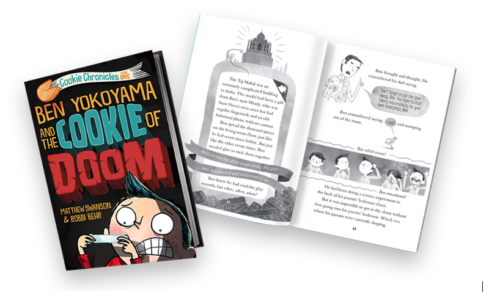
RB: Good work. Lili will be pleased. Go on.
MS: For the pre-K through 1st graders, we’re handing out Everywhere, Wonder, a picture book about exploring the world and connecting with others through storytelling.
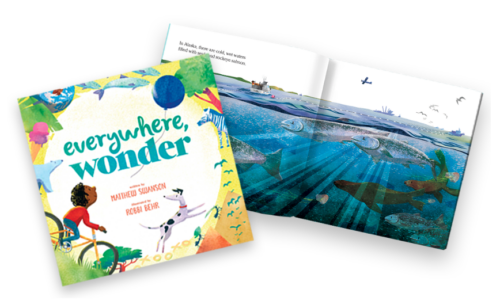
RB: First Book helped us get the best possible prices for the books. Which was great. They also helped us identify the schools we’ll be visiting.
First Book has a membership of more than 525,000 Title I-eligible educators, and they put out a call to anyone who had previously ordered our books from the First Book Marketplace, which was around 1,100 people.
MS: From those 1,100, we received about 300 applications.
RB: In the application, we asked about school location, demographics, and size. We asked if they’d ever had an author visit before.
MS: And we included an open-ended question about what the opportunity would mean to the community. Ultimately, it was those essays that helped us make the tough decisions.
RB: We did our best to choose a wide range of sizes, demographics, and locations, though I must say we leaned a little toward the rural, because I have a soft spot in my heart for schools in the middle of nowhere.
MS: We are visiting a few schools that are so remote that when we first started having conversations with the educators we selected, they said “Are you sure you know where we are?”
RB: We’re going to some schools that are so far off the beaten path that only an irrational family with a school bus would go there.
MS: We also chose schools where educators were doing amazing work in the face of major challenge. A big part of our storytelling will be spotlighting their effort and ingenuity, the challenges they face, and the opportunities that more resources could bring.
RB: We selected our schools based on all these different factors. The essays were all wonderful and heartbreaking, and honestly, we could have chosen at random and would have still had an amazing group of schools.
MS: We wanted to visit them all. But since we knew we couldn’t, we decided to create pre-recorded versions of our tour presentations for the schools that applied but weren’t selected.
RB: But then realized that because everyone has become so familiar with virtual learning, we should just make them available to any Title I educator who’s interested.
MS: We’ve also developed some supporting curricular materials that prepare students for our assemblies by introducing them to the themes of our books—and that give them a chance to reinforce those themes afterward.
RB: And we’ve recorded a few simple drawing tutorials — which is an easy way to engage and excite kids with gratifying results in short order – while also teaching them some basic illustration techniques.
MS: The presentations, curricular materials, and drawing tutorials are available for free on our website for any Title I-eligible educator to share with their classroom or community.
RB: We’d love to visit every Title I elementary school in America, but since we can’t, we hope these materials will create the option for a free virtual author visit, complete with related activities.
MS: Feel free to share this link with your followers so they can get the word out to their communities and networks.
RB: But wait! There are even more tentacles in the spaghetti! We are super excited to be partnering with First Book and Build-a-Bear Foundation to give away an additional 125,000 books through the First Book Marketplace.
MS: We’re thrilled that so many more books will find their way into the hands of Title I-eligible educators and students—and that the vast majority of these books will be by other creators.

RB: Before we forget to mention it, First Book is also handling shipping our books to all the schools we’ll be visiting!
MS: Yes. It’s a small thing but it’s also a huge thing. Thank goodness we will not actually be traveling with 25,000 books. Our family barely fits in the bus as it is. The books will be stored, with much gratitude, in the First Book warehouses and will be shipped directly to each school a few weeks before our visit.
RB: Which exposes the fundamental lie at the core of the Tour’s name.
MS: But the “Bus With No Books Tour” didn’t have quite the same ring to it.
BB: Oog. Yeah. Agreed. Now one aspect of the tour that I’d like to delve a little deeper into is the work you’re doing with Washington College. One doesn’t usually think of colorful buses and researchers (unless it involves Dr. Bunsen Honeydew in The Muppet Movie, of course) so could you tell us a little bit more about what data you’ll be helping to find?
MS: Any librarian or teacher who’s witnessed an author or illustrator school visit will tell you about the excitement and engagement they create, but there’s not much evidence of the benefits beyond the anecdotal.
RB: There have been some attempts to quantify the impact through research, but they’ve been limited by the fact that author visits are usually one-offs, so the sample size isn’t very big or diverse.
MS: Robbi and I were at a party last summer talking about the Tour with a friend of ours who is an education professor at Washington College here in Chestertown. We were interested in picking her brain about literacy research.
RB: As much as we love doing school visits and meeting kids and making books, we are in no way authorities on literacy efforts that have been going on through the hard work of a lot of people for a long time.
MS: When we told our friend what we were up to, her ears perked up and she said, “Oh, I have some data to help you make the case about the need for this tour.” That conversation turned into a coffee date, during which her ears kept getting perkier, until she finally said, “Hold on a second, folks. This is an opportunity to capture, at a large scale, across a diverse national sample, in the course of a single year, data that could make a huge difference in the way people think about these types of literacy interventions.”
RB: Her name is Sara Clarke-De Reza. She is fantastic and wonderful, and we’re so excited to be working with her.
MS: Sara assembled a team of four other education professors, all of whom have background in literacy and elementary education. The team also includes a sociologist who is a major data sets expert. He’s going to cross reference the data we collect with national data from the Department of Education so he can add additional layers of insight to the intel we’ll be gathering at the local level.
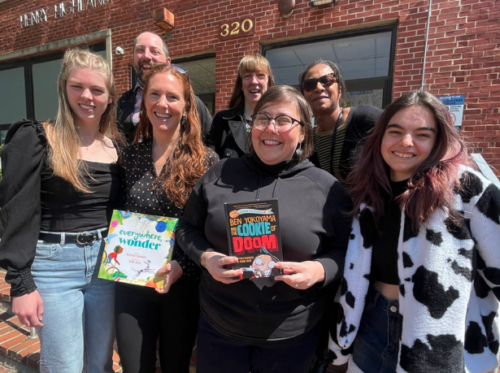
RB: Of the schools we’re visiting, 30 have agreed to participate. It will be a data set of about 10,000, which the research team is really excited about.
MS: Students will take three surveys: the first right before our visit, a second immediately after our presentation, and a third one month later. The surveys will measure shifts in attitudes about reading, writing, and drawing—in the short term and slightly longer term as the result of our visit.
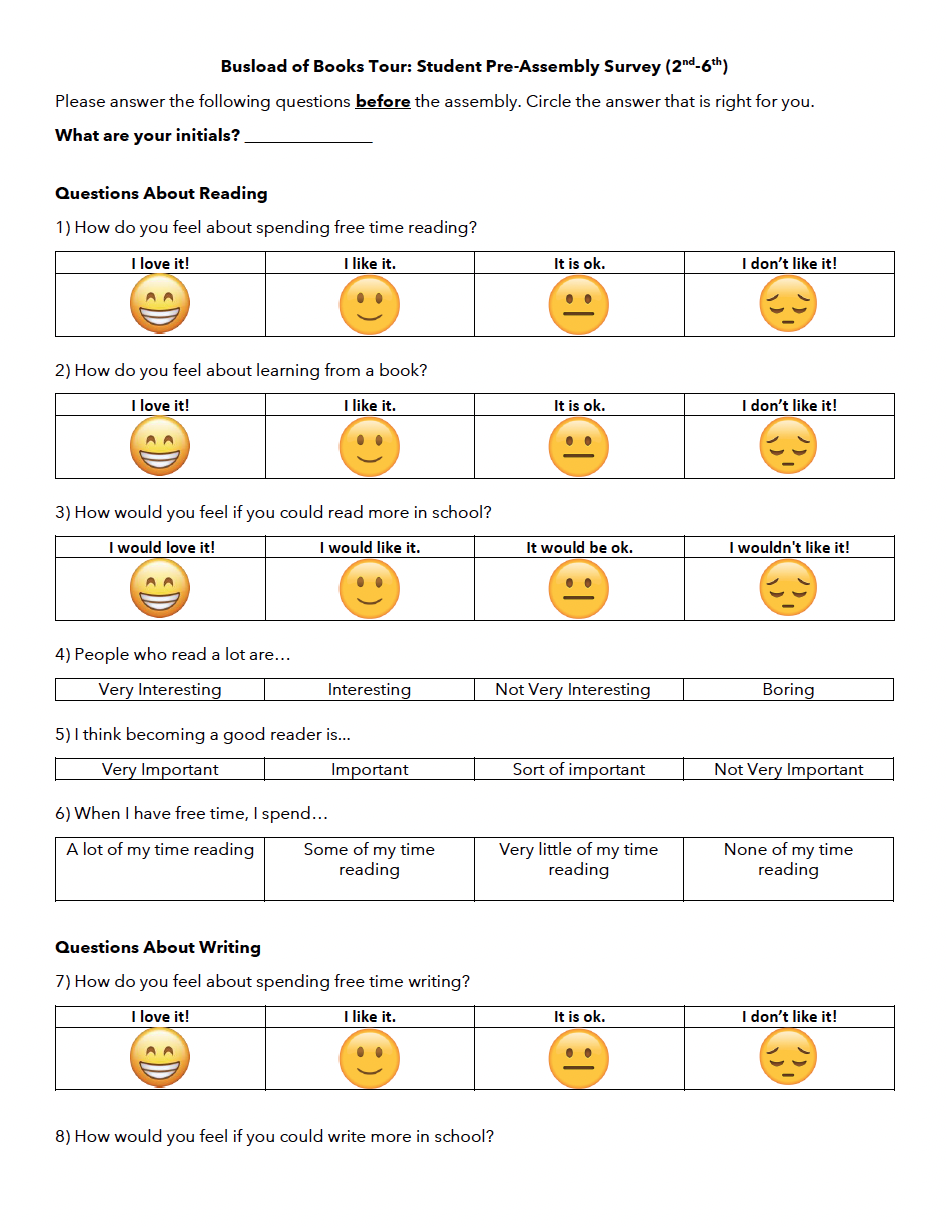
RB: Teachers will take a pre-visit survey that asks questions about students’ access to books and opportunities to read in the classroom and a second survey a month after our visit.
MS: And key administrators—the principal, librarians, Title I coordinators, and reading specialists, will take a single survey that captures a snapshot of what’s happening on the literacy front at the school-wide level—to provide context for the classroom-specific results.
RB: We know it’s really hard to move the needle with a single assembly. But, at the least, we hope to collect some useful info that captures the overwhelmingly positive individual experiences we see kids having during author visits.
MS: In the octopus spaghetti swimming metaphor, this is a very exciting tentacle we’re so grateful to be a part of.
RB: Sara and the rest of the team turned their academic lives entirely upside-down to make this study happen. It has been really humbling to get to know and partner with so many amazing people—the research team to the teachers and staff and school admins to the folks at First Book and Build a Bear Foundation—who are all working so hard on behalf kids who don’t always have someone in their corner.
BB: It does make the term “team effort” sound relatively paltry. And you’ve already been on the road, visiting schools, seeing kids. What have you seen so far? Any particular stories you’d like to share about your experiences?
MS: We visited a school where the kids have to bring their own toilet paper because the school lacks the budget to provide it. We went to a school where a little girl grabbed Robbi when it was time to leave and said, “Please don’t go. I need you to stay.”
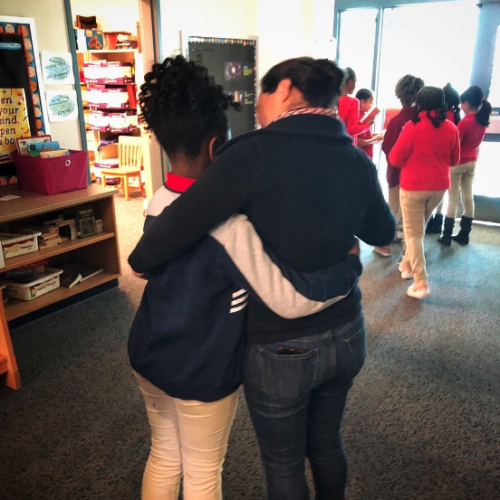
RB: At a visit this past fall, a seven-year-old boy came back to us, two hours after our presentation, to show us the book he’d already started writing and illustrating. And this was a kid who the teachers had never been able to interest in reading before. But some switch got flipped and he decided to write his own book.
MS: He was so excited. Super shy, but so pleased to show us his book.
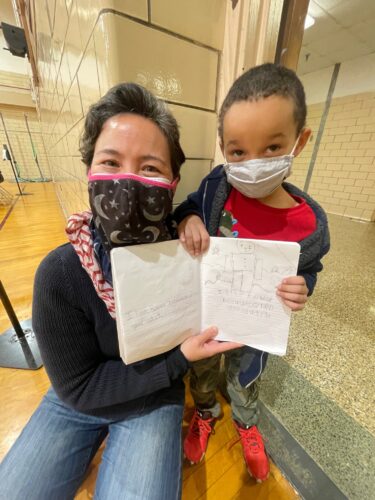
RB: At every school we visit, there are always a handful of kids who we can tell it’s going to make a profound difference for. And if that happens for a few kids in each of these schools, then it’s totally worth it. This is the part where the stage directions say, “her voice cracks with emotion.”
[Her voice cracks with emotion]
MS: We’re hoping for impact on two levels. On one hand, the granular. Here’s a kid who is really moved by the presentation and whose life could be changed for the better by a single experience. A kid who might develop a new interest or passion that could unlock further opportunities.
RB: But we also hope to bring excitement or energy at the school level. Helping a whole community tap into the fun and possibility in reading, drawing, and storytelling. This is the kind of impact the research might be able to measure and hopefully create justification for more author visits or other literacy interventions that might, taken together, move the dial in a larger way.
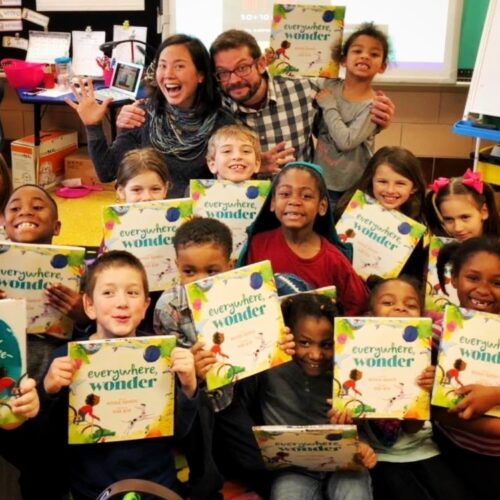
BB: So you’ll be visiting all 50 states, which is more than a little impressive. This begs the obvious question, so I just gotta ask it: How will you be getting to Alaska and Hawaii?
RB: We will not be taking the bus to Hawaii. I’m sorry Hawaii, but trying to figure out the logistics of shipping a bus to you was just too difficult.
MS: We’ll be leaving the bus with my wonderful cousin and flying from Atlanta.
RB: We’re also leaving Dumbles the irrational dog with Matthew’s Uncle Paul.
MS: But Uncle Paul is a professional dog whisperer, so perhaps he’ll teach Dumbles to be rational.
RB: Impossible.
MS: The bus will be coming to Alaska, though.
RB: Yep. We’ll head north at the end of May, driving up through British Columbia and the Yukon, across Alaska, and then down to Anchorage or possibly Homer, which is the end of the road.
MS: Then we’ll charter a bush plane to fly us down the Aleutian Peninsula to Port Heiden, which is a small Native village with a one-room-schoolhouse.
RB: There are seven students in the school, who will come back for a special summer session.
MS: One of the reasons we’re so excited about this school and community is that it’s really just a puddle jump down the peninsula from the place Robbi has been coming with her family every summer since she was 18 months old. Her dad bought into a piece of land and a fishing operation in the Alaskan bush in the late 1970s.
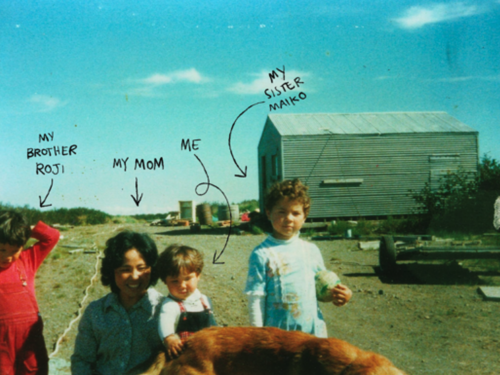
RB: Sight unseen.
MS: So irrational!
RB: And he’s not even a dog!
MS: Irrational is the theme of the interview.
RB: Of our lives, I’m afraid.
MS: Robbi grew up spending every summer working with her family to run a small sockeye salmon fishing operation.
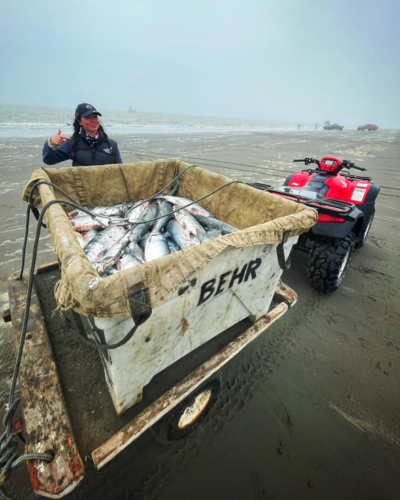
MS: The tradition has now passed onto the next generation. Our picture book Sunrise Summer is about our daughter’s first summer being part of the fishing crew. Our kids love it up there. It’s their opportunity to sample a bit of wildness.
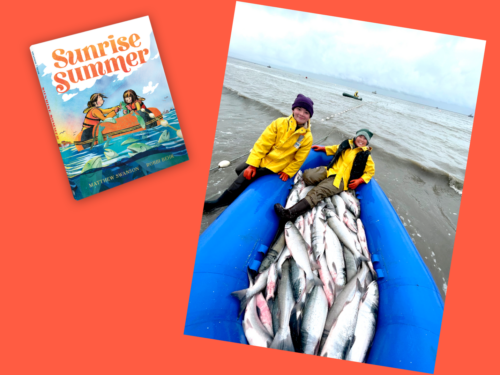
RB: We’re off the grid. We collect water from a spring and drive it three miles up the beach to our cabin. Our kitchen sink that runs off of a battery-powered pump. We have an outhouse.
MS: That I dug the hole for. It’s a great hole.
RB: In addition to making mac and cheese and chasing away grizzly bears, Matthew digs outhouse holes. He’s so useful.
MS: We have a solar panel that charges a bank of batteries so that we can charge our phones, which don’t work, because there’s no internet.
RB: We don’t have any lights in our house because you don’t need lights when the night is only three hours long.
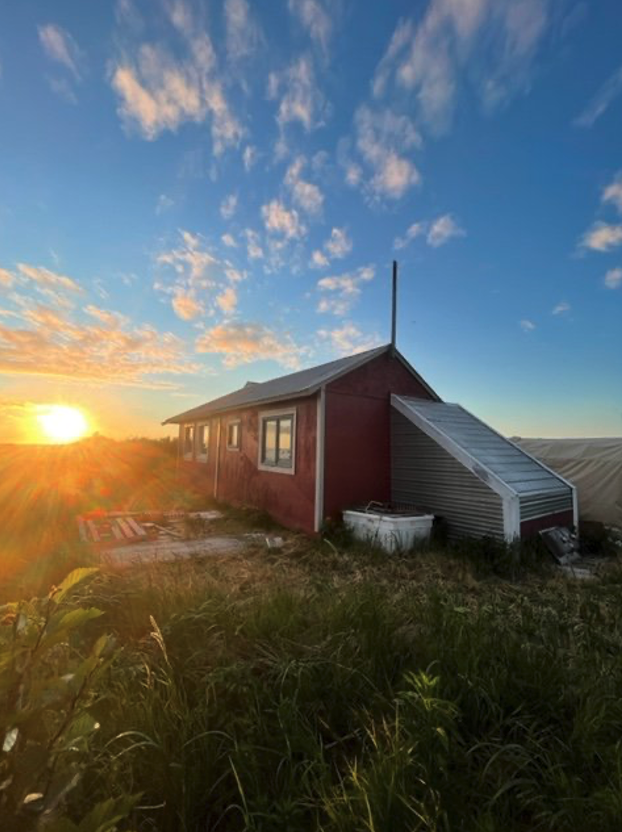
MS: Just like you don’t need a bathroom on a bus?
RB: Exactly! Our summers in Alaska are one of the main reasons I think our family will survive life on the bus. Except maybe Matthew.
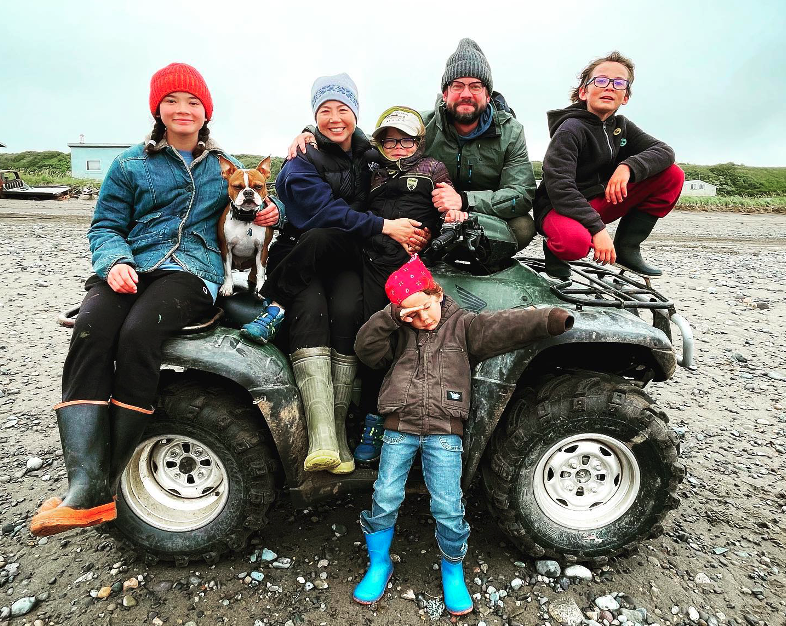
MS: I will rise to the occasion. What if we encounter a situation where you need someone to dig an outhouse hole? Honestly, in a year with no bathroom, the chances seem pretty high.
RB: No matter what happens, it’s going to be an adventure for our entire family, a chance to live on a different kind of frontier. It could be extremely great or it could be totally awful but no matter what, it’s going to be memorable.
BB: I see you’re setting out September 1st (Thursday!!). That means much of your driving will be during the winter months. Are you planning where you’ll visit depending on what the weather might be at that time of year?
RB: Exactly. We’re doing a lot of zig-zagging.
MS: It’s definitely not rational.
RB: What are you talking about? It’s highly rational!
MS: The squiggle does not look rational. It’s inefficient.

RB: You will thank me when we’re not stuck in a blizzard in Montana in March. Knock on wood.
MS: Here’s the link to our route if your readers want to see where we’re going to be at various times of year. And here’s a link to the database of schools we’ll be visiting.
RB: The dates for the school visits are all set in stone. We have a few other stops planned—partnering with some literacy organizations and visiting some independent bookstores—but most of the rest we’ll figure out as we go along.
MS: We’ll be spending some nights in friends’ driveways and other nights in RV parks or campgrounds or boondocked on state land, and some nights we’ll be sleeping in Wal-Mart parking lots.
RB: There might be a few motel stays if the weather is bad or Matthew is especially cranky.
MS: Robbi, fortunately, is a solver of problems. Matthew, fortunately, really likes driving the bus.
RB: Matthew is goal-oriented, I am process oriented. Which is why Matthew bemoaned the inefficiency of our route and Robbi defended its rationality.
MS: Usually when we’re on a road trip, I just want to get there. I do not want to meander and dilly-dally. But I promised Robbi that, for this year and this year only, she can be in complete control of our itinerary. She’s planning our route, and she’ll tell me where to go and I will go there with a smile on my face.
RB: We are going to be seeing so many giant balls of twine, because that is the stuff Robbi loves.
MS: I secretly love them, too.
BB: Well, folks, this has been a helluva interview. I can’t think of a time I’ve had such a marvelous combination of back-and-forth conversing and remarkable info. I think the only other question I have is how can folks help with what you’re doing?
MS: Honestly the most helpful thing your readers can do is spread the word about the trip. The more people following our adventures, the greater impact we can have on the awareness-building front.
RB: We plan to make it fun to follow along! We’ll be posting stories and photos and videos every day on our blog and social media.
MS: Our daughter will be offering the kid perspective by making a video about each state we visit.
RS: She and our oldest son will be hosting a monthly program for kids that will be co-hosted by the librarian in our hometown public library.
Our intern Isabel is writing a fun, fact-filled blog post about each and every state.
MS: The wonderful Alison Morris, who is First Book’s Senior Director of Title Selection, has been a huge help in connecting us with other creators, educators, and literacy champions, so we’ll also be sharing stories of the great work others are doing to create opportunity and excitement around reading.
RB: We’d truly appreciate your readers’ help getting our free presentations and drawing demos into the hands of as many fellow Title I educators and librarians as possible. Here’s the link.
MS: Obviously, if anyone feels compelled to contribute, we’ll use the money to buy hardcover books for kids and to get ourselves to those kids to hand them out. We’re funding the trip entirely via grassroots donations from people who believe in the mission.
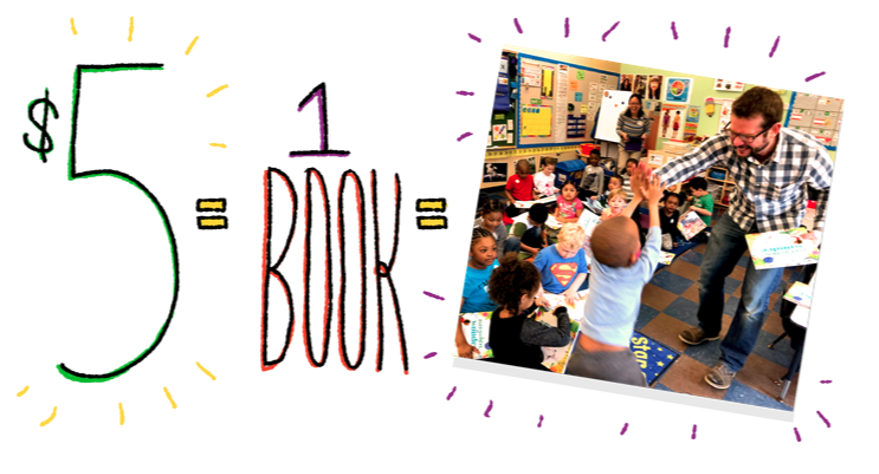
RB: We have a GoFundMe page for smaller donations and a partner nonprofit collecting tax-deductible contributions of $100 and above on our behalf.
MS: If you go to www.busloadofbooks.com, there’s a donate button in the top menu.
RB: That’s also where you’ll find our trip blog, FAQ, more info about the research project, and an inquiry form, in case anyone wants to get in touch with us.
MS: The best place to follow the Tour on social media is our Instagram account.
RB: Thanks for giving us this opportunity to connect with your readers.
MS: The more people who tune into our storytelling, the more widely we’ll be able to spread the word about the challenges facing our nation’s public schools—and the great work of teachers and librarians in these communities.
RB: We suspect some of them are reading this, and if that’s true, we want to thank them for all hard work they do every day. It’s the most important job on the planet, and we want everyone to know it.
MS: And now we must go tend to the octopus. Today’s tentacles include ordering nesting cookware, meeting with our homeschool math tutor, and trying to figure out the bus wifi situation.
RB: But that all sounds so rational.
MS: The bus we’ll be living in for a year with four children, no toilet, and one dog. Do you feel better, now?
RB: Much.
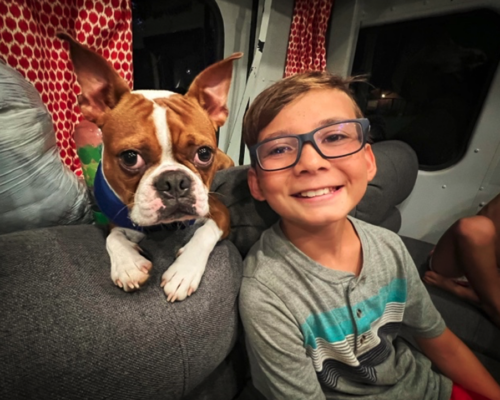
RB: Thanks, Betsy—and to everyone who took the time to read this. We hope to see you on the road!
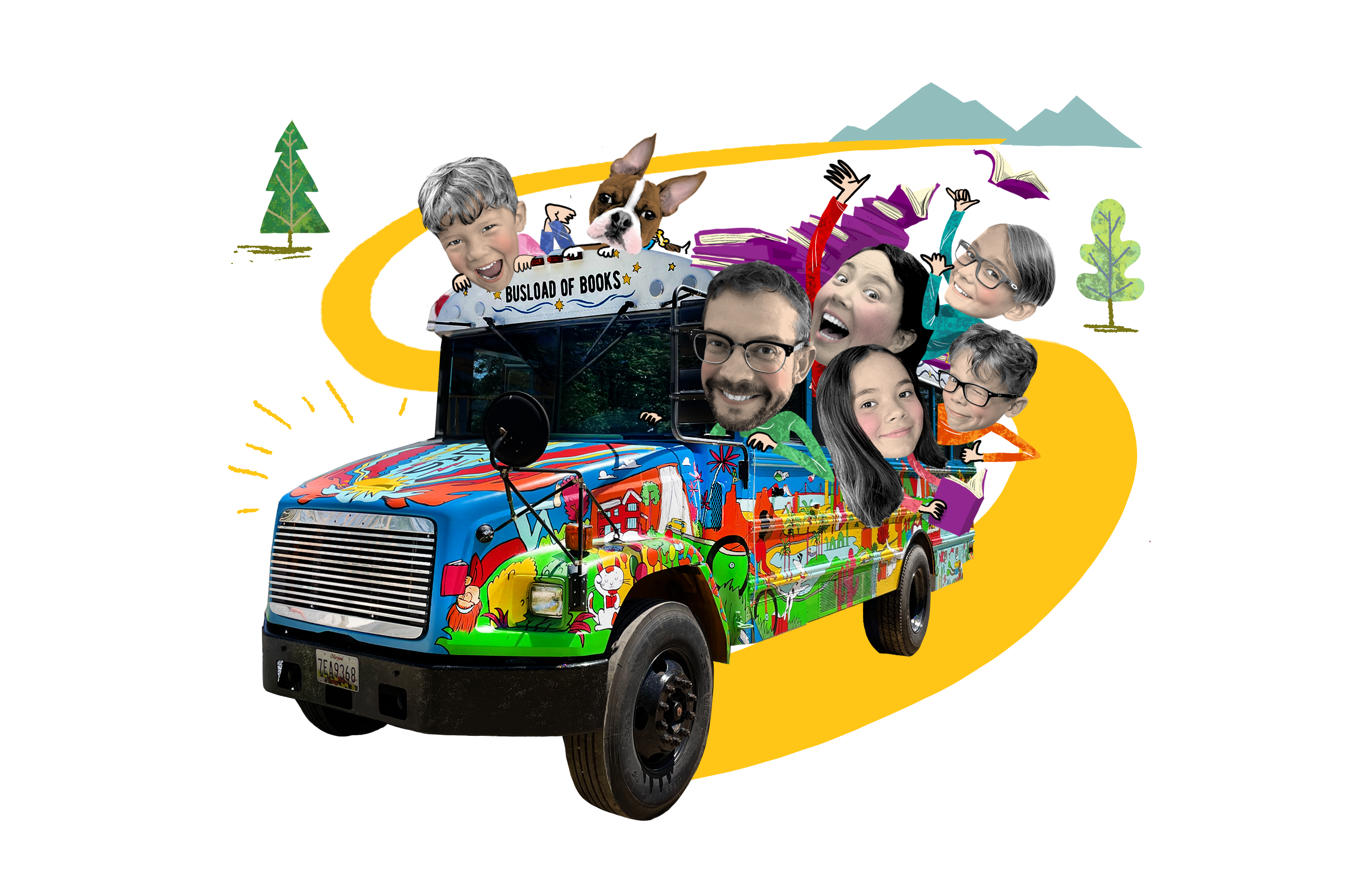
To learn more, follow, or contribute: www.busloadofbooks.com
To follow on Instagram: www.instagram.com/robbi.and.matthew/
To share free presentations and materials: www.busloadofbooks.com/titleone
Foof!
I wasn’t kidding when I said this crew tuckered me out. Huge thanks to Alison Morris for even suggesting I speak with these beautiful bus people in the first place. And, of course, thanks as well to Robbi Behr and Matthew Swanson for taking a HUGE amount of time out of an already busy schedule to speak with me today.
Filed under: Uncategorized
About Betsy Bird
Betsy Bird is currently the Collection Development Manager of the Evanston Public Library system and a former Materials Specialist for New York Public Library. She has served on Newbery, written for Horn Book, and has done other lovely little things that she'd love to tell you about but that she's sure you'd find more interesting to hear of in person. Her opinions are her own and do not reflect those of EPL, SLJ, or any of the other acronyms you might be able to name. Follow her on Twitter: @fuseeight.
ADVERTISEMENT
ADVERTISEMENT
SLJ Blog Network
2024 Books from Coretta Scott King Winners
Family Style: Memories of an American from Vietnam | Review
Parsing Religion in Public Schools
ADVERTISEMENT




